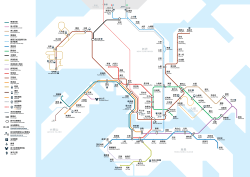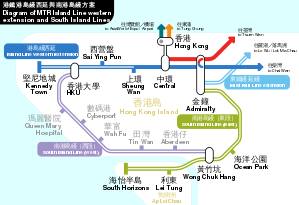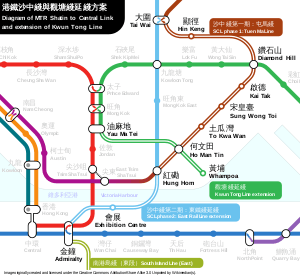Future projects of the MTR
Several future projects on the MTR have been put forward by the MTR Corporation to the Hong Kong Government, with some already under construction.

With the rail merger with the Kowloon-Canton Railway Corporation in 2007, the combined network increased to 211.6 kilometres (131.5 mi) and 84 stations. Committed and future railway projects will increase the network to over 270 kilometres (170 mi) by 2019 and 98 stations while the rest of the projects may further increase it to over 540 kilometres (340 mi).
New lines
South Island line (West)

On 21 January 2003, the Executive Council of Hong Kong granted MTR Corporation Limited permission to proceed with further planning on two proposed lines: West Island Line and South Island line. These new lines are suggested in the Second Railway Development Study (RDS-2) to provide direct links between the residential areas of Wah Fu and Ap Lei Chau in Southern District and the CBD of Hong Kong. This is the first project within the MTR that serves the Southern District.
Three proposals were previously submitted, each addressing the drawbacks of the prior plan. In this planning stage a feasibility study was conducted to optimize the new lines in terms of cost-effectiveness, external benefits and the effect on other modes of transport. The plan was eventually turned down by the government in favour of constructing highways in late March 2004. The MTRC's fourth proposal was given in February 2005. This consisted of West Island Line extending the Island line to Kennedy Town, South Island Line (East) from Admiralty to Ap Lei Chau and South Island line (West) that connects the previous two lines. Legislative Councillors support an earlier completion of West Island line. The West Island line was finally approved by the HKSAR Government on 30 June 2005.
The South Island line (East) opened on 28 December 2016.
Plans for the South Island line (West) were mentioned and revised in the 2014 governmental railway strategy report and an "implementation window" of 2021 to 2026 was identified.[1] South Island Line is still under planning as of 2020.[2]
Sha Tin to Central Link

The Kowloon-Canton Railway Corporation won the bid to build and operate the Sha Tin to Central link in 2002. The KCRC announced modification to the proposal. An 11 km Tai Wai to Hung Hom section connecting the Ma On Shan line with the Kowloon Southern Link which connects to the West Rail line will form the Tuen Ma line while a 6 km cross-harbour section extending the East Rail line to Hong Kong Island.
The project now belongs to the MTR after the 2007 rail merger. The section of the Sha Tin to Central link between Tai Wai and Hung Hom is expected to fully open by 2021, and the remaining cross-harbour section in 2022.[3]
Northern Link
The Northern Link will provide a cross-boundary link for the West Rail line and create a new railway corridor between the West Rail line and the East Rail line in northern New Territories. The completion of the project is already deferred because the Express Rail Link is absorbed into the High-Speed Rail Link. The Northern Link may not now be viable without substantial housing developments in the New Territories to assist in building costs, but with the extension to Ping Che/Ta Kwu Ling, these were examined under the RDS 2013. There is currently no schedule for construction.
North Island line

This would link the Tung Chung line (Hong Kong station) and the Tseung Kwan O line (at North Point). There is no currently no schedule for construction.
East Kowloon line
The original scheme of the East Kowloon line would connect Diamond Hill station via Hung Hom station to Sheung Wan station. It was refined and merged into what is today known as the East West Corridor without crossing the harbour to Sheung Wan.
In 2014, another railway scheme of the same name was unveiled by the government which would provide metro service in the opposite direction to Po Lam station, HKUST Station, via Sau Mau Ping. The 2014 railway development strategy recommended the new line would begin construction in 2019 and be finished in 2025.[1] However, construction has yet to begin and there is no schedule for construction.
Tung Chung Line Extension
Tung Chung East and Tung Chung West
In April 2020, Carrie Lam and the Executive Council approved the detailed planning and design of the Tung Chung Line Extension project.
It is scheduled to begin construction in three years, while the cost of the two new Stations, Tung Chung East and Tung Chung West, are expected to cost HK$18.7 billion.
This extension is expected to be complete by 2029.
Track Extension near Hong Kong Station
Meanwhile, an underground tunnel, around 0.5 km long, will be built Eastwards of Hong Kong station to allow Tung Chung Line and Airport Express trains to turn around, allowing the trains to easily switch directions, enhancing the potential frequency of operation. The project is expected to extend the line by an additional 1.5 kilometers.
The contract for the extension was recently awarded to British engineering companies Arup and Atkins.
Tung Chung to Tai O Light Rail System
Since December of 2017, CEDD has hired a consultant who has been studying the possibility of a light rail link between Tung Chung Station and Tai O Fishing Village on Lantau Island. The light rail will go around Tung Chung, the airport and the Hong Kong-Zhuhai-Macau bridge and will take only 15 minutes to make the trip, opposed to the 45 minute bus ride along a small, winding road from Tung Chung or Mui Wo. The estimated cost of this proposal is HK$15 billion. The consultancy is scheduled to be completed within the year 2019. As the light rail runs on overhead lines, it will have a light environmental footprint.[4]
Cable Car System from Ngong Ping to Tai O
In March 2019, CEDD released an executive study outlining an option of the proposed Cable Car extending from Ngong Ping village to Tai O. This proposal was suggested to be ran by Hong Kong MTR.
Environmentally Friendly Linkage System
The Environmentally Friendly Linkage System, abbreviated to EFLS and commonly called the Kai Tak Monorail, is a government-proposed monorail system in the Kai Tak Development area, Hong Kong[5] with 12 stations. The system's construction was estimated to start in 2018 for completion in 2023.[6][7] The new links are expected to account for 15 percent of public transportation in the Kowloon East Development. The system is expected to cost $12 billion Hong Kong dollars.[8]
Hong Kong–Shenzhen Western Express Railway
Lantau Tomorrow Vision
The Lantau Tomorrow Vision plan involves creating direct railway links from Kau Yi Chau artificial islands to Hong Kong Island West, North Lantau and coastal areas of Tuen Mun.[9]
Other stations
Other studied areas for expansion include:
- Confirmed short extension of the Tung Chung line to Tung Chung East station.[1]
- Confirmed short extension of the West Rail line toward the Tuen Mun South station
- Possible short extension of the Tung Chung line to Tung Chung West station.[1]
- A new station on the Tung Chung line at Siu Ho Wan, to serve a planned property development atop Siu Ho Wan depot.[10]
- A new station on the West Rail line called Hung Shui Kiu station
- Possible short extension of the Island line to Siu Sai Wan station.[1]
- An additional station on the Lok Ma Chau spur line at Kwu Tung has been proposed as a single proposal. It had previously been included within the Northern link project.
Outsourcing
The MTR Corporation is planning to outsource its services centres of 14 stations on the Island line. Around 100 employees will be arranged to work at the Disneyland Resort line and the AsiaWorld-Expo station. Services centres on the new stations of Tseung Kwan O line had already been outsourced when it started its service.
References
- "Railway Development Strategy 2014" (PDF). Transport and Housing Bureau. September 2014.
- "Economy revival fears over major delays to Hong Kong rail projects". South China Morning Post. 13 June 2020. Retrieved 8 July 2020.
- "Projects - Shatin to Central Link". MTR Corporation. Retrieved 25 September 2008.
- "大嶼山輕軌方案 最快後年完成評估". www.singtaousa.com. Retrieved 28 December 2019.
- 政府擬建高架鐵路連接九龍東不同地點 Archived 2016-04-29 at the Wayback Machine
- 林鄭月娥指啟德鐵路如經新蒲崗土瓜灣將降低回報率
- 林鄭月娥指啟德高架鐵路工程不應只著眼於回本
- "Study Overview". Environmentally Friendly Linkage System. Civil Engineering and Development Department. Retrieved 14 December 2015.
- "LCQ5: Lantau Tomorrow Vision". www.info.gov.hk. Retrieved 8 July 2020.
- "Siu Ho Wan Station and Siu Ho Wan Depot Replanning Works – Executive Summary" (PDF). Environmental Protection Department of the Government of Hong Kong. July 2017. Retrieved 26 December 2018.